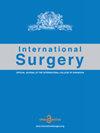当血管内治疗不容易或不成功时,主动脉上支架闭塞性疾病中的颈动脉-脊椎或颈动脉-锁骨下移位
IF 0.2
4区 医学
Q4 SURGERY
引用次数: 0
摘要
尽管血管内治疗取得了进展,但一些患者会出现椎动脉狭窄或锁骨下动脉闭塞,可能无法从微创血管成形术/支架术中获益。本研究描述了4例在血管内治疗不可行或不成功的情况下采用颈动脉-脊椎移位术(CVT)或颈动脉-锁骨下移位术(CST)的病例。病例1:一名65岁女性,右椎动脉口严重狭窄,左椎动脉发育异常,右锁骨下动脉近端和头臂干动脉瘤样扩张。病例2:一名23岁的女性,因大动脉炎导致左椎动脉第一部分严重狭窄。由于血管内介入治疗是不可行的,在病例1和2中进行了CVT。病例3:一名73岁的男性,右锁骨下动脉近端完全闭塞,右颈内动脉严重狭窄。病例4:一名58岁的男性经历了左锁骨下动脉完全闭塞和左颈总动脉严重狭窄。双相超声检查显示椎动脉回流与椎盗综合征一致。血管内治疗不成功,因为金属丝没有穿过锁骨下动脉的闭塞。在病例3和4中,CST与同侧颈动脉内膜切除术同时进行。本系列病例表明CST和CVT是治疗锁骨下或椎动脉病变的有效方法。尽管血管内支架植入和血管成形术已被提倡作为一线管理,但当血管内干预不成功或不可行时,CST和CVT应被视为补救措施。本文章由计算机程序翻译,如有差异,请以英文原文为准。
Carotid-Vertebral or Carotid-Subclavian Transpositions in Supra-Aortic Steno-Occlusive Diseases When Endovascular Therapy Is Unfeasible or Unsuccessful
Despite advances in endovascular therapies, some patients experience vertebral artery stenosis or subclavian artery occlusion and may not benefit from less-invasive angioplasty/stenting. This study described 4 cases in which carotid-vertebral transposition (CVT) or carotid-subclavian transposition (CST) was adapted when endovascular treatment was unfeasible or unsuccessful.
Case 1: A 65-year-old woman presented with severe stenosis of the right vertebral artery ostium, dysplastic left vertebral artery, and aneurysmal dilatation of proximal right subclavian artery and brachiocephalic trunk. Case 2: A 23-year-woman had severe stenosis at the first portion of left vertebral artery caused by Takayasu's arteritis. Because endovascular intervention was unfeasible, CVTs were performed in cases 1 and 2. Case 3: A 73-year-old man presented with total occlusion of the proximal right subclavian artery and severe stenosis of the right internal carotid artery. Case 4: A 58-year-old man experienced complete occlusion of the left subclavian artery and severe stenosis of the left common carotid artery. Duplex ultrasonography showed reverse flow in the vertebral artery in keeping with vertebral steal syndrome. Endovascular treatment was unsuccessful because the wire did not cross the occlusion of the subclavian artery. CSTs were performed with concurrent ipsilateral carotid endarterectomy in cases 3 and 4.
The present case series demonstrated that CST and CVT were effective treatment modalities for subclavian or vertebral artery lesions. Although endovascular stenting and angioplasty have been advocated as first-line management, CST and CVT should be considered as the remedy when endovascular intervention is unsuccessful or unfeasible.
求助全文
通过发布文献求助,成功后即可免费获取论文全文。
去求助
来源期刊

International surgery
医学-外科
CiteScore
0.30
自引率
0.00%
发文量
10
审稿时长
6-12 weeks
期刊介绍:
International Surgery is the Official Journal of the International College of Surgeons. International Surgery has been published since 1938 and has an important position in the global scientific and medical publishing field.
The Journal publishes only open access manuscripts. Advantages and benefits of open access publishing in International Surgery include:
-worldwide internet transmission
-prompt peer reviews
-timely publishing following peer review approved manuscripts
-even more timely worldwide transmissions of unedited peer review approved manuscripts (“online first”) prior to having copy edited manuscripts formally published.
Non-approved peer reviewed manuscript authors have the opportunity to update and improve manuscripts prior to again submitting for peer review.
 求助内容:
求助内容: 应助结果提醒方式:
应助结果提醒方式:


